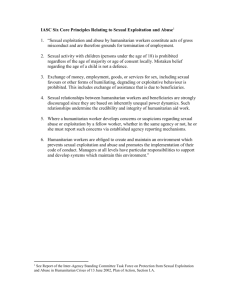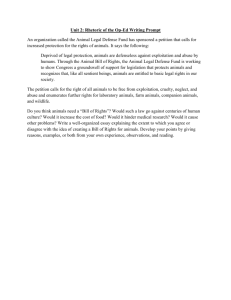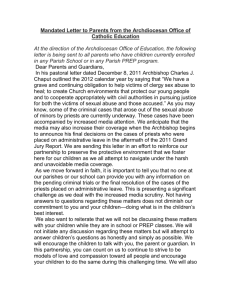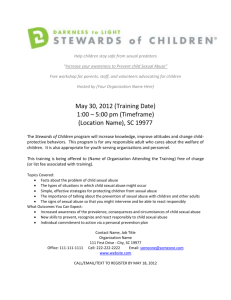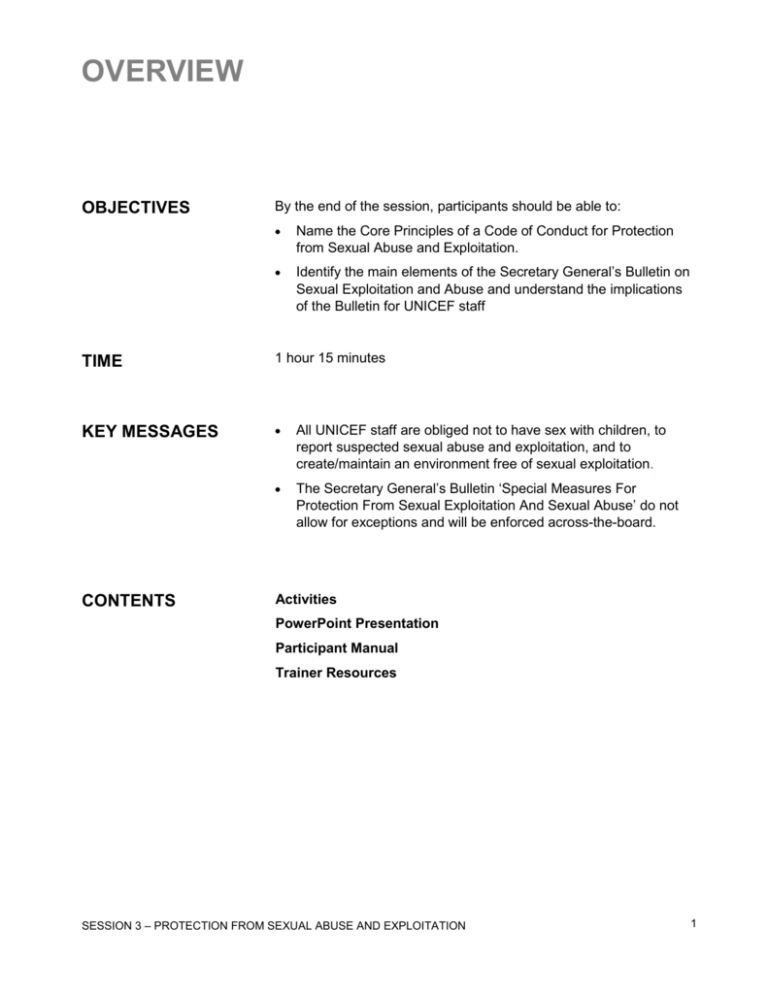
OVERVIEW
OBJECTIVES
By the end of the session, participants should be able to:
Name the Core Principles of a Code of Conduct for Protection
from Sexual Abuse and Exploitation.
Identify the main elements of the Secretary General’s Bulletin on
Sexual Exploitation and Abuse and understand the implications
of the Bulletin for UNICEF staff
TIME
1 hour 15 minutes
KEY MESSAGES
All UNICEF staff are obliged not to have sex with children, to
report suspected sexual abuse and exploitation, and to
create/maintain an environment free of sexual exploitation.
The Secretary General’s Bulletin ‘Special Measures For
Protection From Sexual Exploitation And Sexual Abuse’ do not
allow for exceptions and will be enforced across-the-board.
CONTENTS
Activities
PowerPoint Presentation
Participant Manual
Trainer Resources
SESSION 3 – PROTECTION FROM SEXUAL ABUSE AND EXPLOITATION
1
SESSION PLAN
Activities
Methodology
Introduction
ADVANCE
PREPARATION
NOTES
2 minutes
Activity 1: The UNICEF Operations
Officer
Interview
Group discussion
20 minutes
Activity 2: Forced Choices Exercise
Group debate
35 minutes
Activity 3: Secretary General’s
Bulletin, Special Measures For
Protection From Sexual Exploitation
And Sexual Abuse
Presentation
15 minutes
Key Messages for Session 3
3 minutes
Total time
1 hour
15 minutes
Action
Done
Ensure 2 sides of the room are accessible. On each
side put a flipchart or post a large piece of paper to the
wall. On each flipchart, write in large letters one of the
following phrases:
Agree
MATERIALS
Duration
Disagree
Item
Ready
PowerPoint Overhead Projector and Screen
Power Point Slides: Session 3
Hi-fi system with speakers with CD component
Audio recording: The UNICEF Operations Officer
Participant Manual
3.1 Special Measures for Protection from Sexual
Exploitation and Sexual Abuse (Secretary-General’s
Bulletin, October 2003)
3.2 Scenarios covering prohibited acts of Sexual
Exploitation and Sexual Abuse for the various categories
of UN personnel
SESSION 3 – PROTECTION FROM SEXUAL ABUSE AND EXPLOITATION
2
Trainer Resources
3.3 Transcript of audio recording, The UNICEF
Operations Officer (in case of equipment failure)
See UNICEF’s Executive Directive CF/EXD/2004-002 for
further guidance on the implementation of the SG’s
Bulletin, as well as the child protection section on the
emergency portal of the Learning Web – available to
UNICEF staff only.
(http://www.intranet.unicef.org/dhr/learning.nsf)
KEY TO ICONS
These icons will help guide you through the session.
Tips for the Trainer
Show Slides
See Trainer Resources Materials
Refer to Participant Manual
Distribute Handouts
SESSION 3 – PROTECTION FROM SEXUAL ABUSE AND EXPLOITATION
3
ACTIVITIES
INTRODUCTION
Time: 2 minutes
Slide 2: Presentation of Session Objectives
Present session objectives, explaining that the intent is for
participants to understand the Core Principles of a Code of Conduct
for Protection from Sexual Abuse and Exploitation, and how to apply
them in real situations.
SESSION 3 – PROTECTION FROM SEXUAL ABUSE AND EXPLOITATION
4
ACTIVITY 1: THE UNICEF OPERATIONS OFFICER
Time: 20 minutes
Materials
Audio recording of interview: The UNICEF Operations Officer
(duration: 8 minutes)
CD player
Text of interview in case of equipment failure (Trainer Resources
3.2)
Purpose
Convey the potential impact on a beneficiary resulting from
sexual relationships between humanitarian workers and
beneficiaries
Provide opportunity for reflection on potential driving motivations
and unusual pressures because of the unstable situation (war,
displaced, family death or separation, etc.) that may be involved
in sexual relationships with beneficiaries
Trainer Context
This is an interview of a young, single, refugee woman who was
involved in a sexual relationship with a UNICEF staff member. The
woman is now 19-years old (18 when she was involved in the
relationship). She lives in a room in a provincial town where UNICEF
has a sub- office to better serve over 150,000 refugees who fled to
the area the year before. Two older sisters live with her in one room,
along with the eldest sister’s 10 year old daughter and 12 year old
son.
This young woman is being interviewed regarding her relationship
with the UNICEF Operations Officer, how it evolved, what happened,
and her feelings or thoughts in retrospect.
(NB Although this interview was created for the purposes of learning,
it is based on a compilation of real life situations).
Instructions
10 minutes
Inform participants that they will be listening to an audio
recording that describes a relationship between a young woman
and a UNICEF Operations Officer. There is no need to state at
this point that the interview is not a real one. This will detract
from the impact of the recording.
Request participants to simply listen, and to not take any notes.
Then play the CD.
SESSION 3 – PROTECTION FROM SEXUAL ABUSE AND EXPLOITATION
5
Participant Discussion
10 minutes
Ask participants, in one word, to summarize how they felt after
listening to the tape. Have the participants write this one word
down on a piece of paper. (Allow participants at least 3-4 mins to
do this. It is difficult to summarize in one word, but when you can,
the cumulative effect as you listen can be powerful.)
Go around the room, and request participants to state ‘their one
word.’ Write these words on a flipchart, not writing words that
have been stated previously.
Do not ask for comments or discussion until everyone has
reported on their word.
Now choose several of the words, and ask participants to tell you
more about what was conveyed by that word for them. Choose
words that seem provocative and could convey differing views.
For example, one participant may say ‘moving’; while another
might say ‘corny’.
Ask the participants: what pressures do you think the young
woman was feeling in this relationship? Did those pressures
justify the relationship? Couldn’t she have just said ‘no’ or left
the relationship when she began to feel abused?
Listen to the participants’ comments and respond and
summarize as appropriate.
The trainer should provide for a transition to Activity 2, by stating,
‘let’s continue this discussion in the next activity.’
SESSION 3 – PROTECTION FROM SEXUAL ABUSE AND EXPLOITATION
6
ACTIVITY 2: FORCED CHOICES EXERCISE
Time: 35 minutes
Preparation
Ensure 2 sides of the room are accessible. On each side put a
flipchart or post a large piece of paper. On each flipchart write in
large letters, one of the following phrases:
Agree
Disagree
Purpose
This exercise is designed to facilitate discussion around the key
principles in the Secretary General’s Bulletin ‘Special Measures For
Protection From Sexual Exploitation And Sexual Abuse’ and to
provide participants with an opportunity to examine their own
assumptions and perspectives on this issue.
Trainer Guidance
If you are conducting this session in a country where the issues that
arise are particularly difficult to discuss due to cultural sensitivities,
an alternative to this exercise that will encourage greater
participation is to have participants discuss the statements in small
groups. Then elicit feedback in the plenary from those who are
willing to speak up. This activity should not be avoided however, as
all UNICEF staff members, no matter their background, have a
responsibility to know and ensure respect for all the core principles.
Instructions
Request participants to stand up and to move to one side of the
room.
Inform participants that you will ask them 5 questions on the new
core principles.
Once you ask a question, upon saying “Choose your Side!”
participants are to move to 1 of the 2 sides that indicates their
response to the question. Point out the 2 sides with the flipcharts
and their corresponding statements.
After the participants move to their ‘chosen side’, ask them to
briefly comment on their choice. Be sure to keep your voice and
tone even and non-judgmental regardless of what participants
say.
Carefully balance your time for this exercise, as discussions can
become very lively and time will speed by.
SESSION 3 – PROTECTION FROM SEXUAL ABUSE AND EXPLOITATION
7
Questions
1) A UN driver who is caught having sex with a minor (under the
age of 18) should be fired.
Correct Answer: Agree
Trainer Note—potential participant responses: While the category
may be overbroad in some cases, i.e. a 19 year old staff member
with a 17 year old - in order to protect children, it is important to have
a firm line. Staff will often raise the mature girl argument, but others
will point to the CRC and universal standards etc.
It is important to note that the Secretary General’s Bulletin requires
our partner NGO’s to abide by the same standards, so that if the
driver worked for a partner NGO, he would also be held
accountable. The Bulletin also creates an exemption for staff
members who are legally married to persons under the age of 18.
It is also important to point out that termination of employment is the
most severe of disciplinary measures and in some cases this would
not be appropriate. In other cases it would be.
2) What a staff member does on his/her own time is their own
business. UNICEF should not interfere in what a staff person
does outside of working hours
Correct answer: Disagree
Trainer note: Issue that will be raised is the right to privacy argument
- however, many will say that the right to privacy is trumped when
we are talking about abuse and exploitation and that UNICEF is a
24-hour a day job. The Bulletin applies during working and nonworking hours. As UN Personnel, we are held to high standards.
3) If the partner is mature and the person’s family does not
object, then the UNICEF staff person may engage in a sexual
relationship with a person under 18.
Correct Answer: Disagree
Trainer Note: potential participant responses: The firm line also
applies here. But this is a really good one for "forced choices" and
expect a good discussion. Expect some staff to again argue culture
vs. imposition of international standards.
4) A UNICEF employee may engage in sex with a beneficiary
over age 18 if both agree.
Correct Answer: Agree
Trainer Note: potential participant responses: The answer could
also be ‘depends’. This question could engender discussion on
power imbalances between beneficiaries and aid workers. However
some participants will share experiences of successful and
legitimate relationships that have developed with beneficiaries. It is
important to note that these relationships are discouraged because
of the inherent power imbalances, however, they are not prohibited.
SESSION 3 – PROTECTION FROM SEXUAL ABUSE AND EXPLOITATION
8
5) If you suspect that a colleague is sexually exploiting or
abusing someone, you must report it.
Correct Answer: Agree
Trainer Note: According to the SG’s Bulletin “Where a humanitarian
worker develops concerns or suspicions regarding sexual abuse or
exploitation by a fellow worker, whether in the same agency or not,
s/he must report such concerns via established agency reporting
mechanisms.”
Request participants to return to their seats.
SESSION 3 – PROTECTION FROM SEXUAL ABUSE AND EXPLOITATION
9
ACTIVITY 3: SECRETARY GENERAL’S BULLETIN ‘SPECIAL
MEASURES FOR PROTECTION FROM SEXUAL
EXPLOITATION AND SEXUAL ABUSE’
Time: 15 minutes
Purpose
This presentation is intended to provide participants with a solid
basis and deeper understanding of how to handle situations where
they may be forced to make difficult choices involving sexual abuse
and exploitation. It is essential that participants know that the Code
of Conduct does not allow for exceptions and will be enforced
across-the-board.
Presentation
Refer participants to 3.1 in their manuals before conducting the
presentation (Secretary General’s Bulletin).
Slide 3: IASC Task Force on Protection From Sexual
Exploitation and Abuse in Humanitarian Crises
The Secretary General’s Bulletin (3.1) results from General
Assembly resolution of 15 April 2003 following the investigation and
report of the grave allegations of widespread sexual exploitation and
abuse of refugee and internally displaced women and children by
humanitarian workers and peacekeepers in West Africa.
The report highlighted the vulnerability of refugees, internally
displaced persons and others, especially women and girls.
Acknowledging the important challenge that this presents to the
entire humanitarian community, in March 2002, the Inter-Agency
Standing Committee (IASC) established a Task Force on Protection
from Sexual Exploitation and Abuse in Humanitarian Crises. In
setting up the Task Force, the IASC recognized that the problem of
sexual exploitation and abuse in humanitarian crises is not confined
to West Africa but is a global problem.
Sexual exploitation and abuse occur in many different environments.
However, in humanitarian crises, the dependency of affected
populations on humanitarian agencies for their basic needs creates
a particular duty of care on the part of humanitarian workers and
peacekeepers, when present. Managers have an additional
responsibility to ensure that there are proper mechanisms to prevent
and respond to sexual exploitation and abuse. Humanitarian
agencies must make every effort to create an environment where
sexual exploitation and abuse are not tolerated. This is especially
necessary given the following features of humanitarian crises:
a) the lack of economic opportunities for displaced populations may
result in commercial and exploitative sex being one of the few
options for income generation to meet basic needs;
b) beneficiary communities have often come from an environment
of gender-based violence with which community structures
collude. Unless proper safeguards are put in place, the same
SESSION 3 – PROTECTION FROM SEXUAL ABUSE AND EXPLOITATION
10
patterns can continue or even be exacerbated in a camp or
settlement environment; and
c) the usual social protections are not in place or are no longer
functioning. Levels of protection and security are generally poor;
justice and policing frequently do not exist in the displaced
environment.
The question of who constitutes a humanitarian worker highlights
another layer of complexity. The group is much more broadly
defined than the internationally engaged staff of humanitarian aid
organisations. Thousands of staff are engaged in a variety of work
ranging from volunteers, casual labourers, drivers and warehouse
guards to decision makers at the country, regional and international
levels. Many of these staff are drawn from beneficiary communities
themselves. This can blur distinctions between what constitutes
professional and private relationships with other members of the
beneficiary community. However, by accepting work with
humanitarian agencies, humanitarian workers also have to accept
the special responsibility of humanitarian care that goes with the job.
Slide 4: The Impact of Sexual Abuse on Girls and Women
The impact of sexual abuse and exploitation falls into 3 categories:
physical, psychological and social. A woman can experience
impacts in all three areas, such as being infected by a STI,
becoming depressed and being stigmatized by others who judge her
relationship negatively. This is not uncommon.
Furthermore, reactions can vary by age, personality, prior sexual
experience, cultural background & availability of a support network.
The foundations of sexual exploitation and abuse are embedded in
unequal power relationships. It represents a complex problem
requiring responses from a broad range of actors and a shift in the
organisational culture and approach of humanitarian agencies.
Slide 5: Definitions
Having the same understanding of key definitions is important when
discussing ethical standards in this area, as differing views can and
do exist.
“Sexual abuse” is actual or threatened physical intrusion of a sexual
nature, including inappropriate touching, by force or under unequal
or coercive conditions;
“Sexual exploitation” is any abuse of a position of vulnerability,
differential power, or trust for sexual purposes; this includes profiting
monetarily, socially or politically from the sexual exploitation of
another; and
“Humanitarian workers” includes all workers engaged by
humanitarian agencies, whether internationally or nationally
recruited, or formally or informally retained from the beneficiary
community, to conduct the activities of that agency.
‘Gender-based violence’ (not shown on slide) is violence that is
directed against a person on the basis of gender or sex. GenderSESSION 3 – PROTECTION FROM SEXUAL ABUSE AND EXPLOITATION
11
based violence includes acts that inflict physical, mental, or sexual
harm or suffering, threats of such acts, coercion, or other
deprivations of liberty. While women, men, boys and girls can be
victims of gender-based violence, because of their subordinate
status, women and girls are the primary victims.
Slide 6: Core Principles
The Secretary General’s Bulletin seeks to ensure respect for, and
fulfillment of, international human rights standards including those
enshrined in the Convention on the Rights of the Child and the
Convention on the Elimination of All Forms of Discrimination Against
Women.
Slide 7: Core Principles Continued
Inform participants that one of the dilemmas facing humanitarian
workers is reporting violations - even when they know beyond a
doubt or know in ‘their gut’ - that a colleague or worker is engaged in
a sexual relationship with a child beneficiary. Under the code of
conduct, however, staff has an obligation to report a concern or a
suspicion of child sexual abuse. While dilemmas do and will occur,
therefore, based on this policy there will be no exceptions and there
is across-the-board enforcement. Findings of sexual abuse and
exploitation will lead to termination of employment.
Slide 8: Summary –Core Principles of a Code of Conduct
for Protection from Sexual Abuse and Exploitation
Summary of the Core Principles
Slide 9: The Reporting Process
Gives the steps of the Reporting Process. Note that UNICEF is still
putting additional measures in place to clarify the reporting process
further. In addition, senior level focal points (and an alternate) for
issues relating to sexual exploitation and abuse will soon be
nominated in each UNICEF office (see Executive Directive
CF/EXD/2004-002 for more information).
SESSION 3 – PROTECTION FROM SEXUAL ABUSE AND EXPLOITATION
12
KEY MESSAGES FOR SESSION 3
Time: 3 minutes
Slide 10: Review of Key Messages
All UNICEF staff are obliged not to have sex with children, to
report suspected sexual abuse and exploitation, and to
create/maintain an environment free of sexual exploitation.
The Secretary General’s Bulletin ‘Special Measures For
Protection From Sexual Exploitation And Sexual Abuse’ do not
allow for exceptions and will be enforced across-the-board.
SESSION 3 – PROTECTION FROM SEXUAL ABUSE AND EXPLOITATION
13

